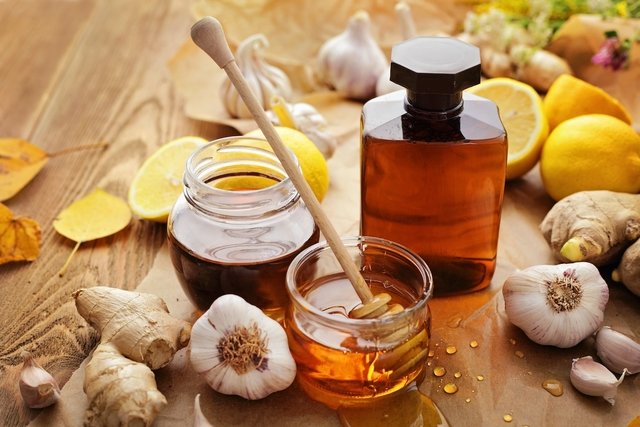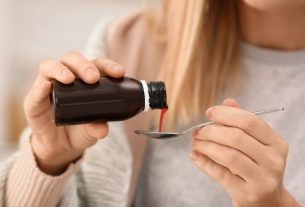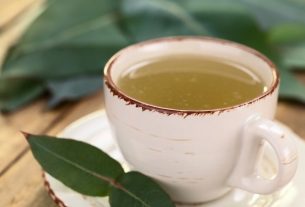Some natural expectorants, such as onion and garlic syrup, carrot syrup or ginger and cinnamon syrup, contain substances that help thin phlegm, facilitating its elimination, relieving coughs.
Coughing is a defense mechanism of the body as a way of eliminating irritating substances or agents from the throat or lungs, being a common symptom of flu, colds, sinusitis, bronchitis or respiratory allergies, for example. See the main causes of coughing with phlegm.
Natural expectorants can help eliminate phlegm and relieve coughing, however, they do not replace medical evaluation and treatment recommended by a pulmonologist or otorhinolaryngologist.
9 natural expectorants
Some natural expectorant options are:
1. Onion and garlic syrup
Onion and garlic syrup helps loosen phlegm as it is rich in sulfur compounds and allicin, with expectorant and antiseptic properties, making it a good natural expectorant option to relieve coughing with phlegm caused by flu, colds or bronchitis.
Furthermore, this syrup strengthens the immune system, reduces inflammation of the respiratory tract, and hydrates the throat.
Ingredients
- 1 medium grated onion;
- 1 clove of crushed garlic;
- Mel.
Preparation mode
Place the onion and garlic in a glass container and add enough honey to cover the onion and garlic. Stir the ingredients and store in the refrigerator overnight.
For children over 2 years old, you can give 2.5 mL of syrup, which is equivalent to about half a teaspoon of syrup, up to 3 times a day. For adults, you can take 5 mL or 1 teaspoon of the syrup, up to 3 times a day. Discard any unused amount of this syrup after 1 week. Check out other ways to use garlic to combat coughs.
Because it contains honey, onion and garlic syrup should not be used by children under 2 years of age, pregnant women with gestational diabetes or people who have diabetes, as it can increase the amount of sugar in the blood and make it difficult to control blood sugar levels.
2. Thyme syrup
Thyme syrup is a good natural expectorant option for inflammation in the throat and lungs, bronchitis, flu or colds.
This is because thyme is rich in anti-inflammatory and antioxidant substances, such as thymol, carvacrol, cymene and linalool, with expectorant action, which allow the elimination of phlegm, relieving coughs.
Ingredients
- 1 bunch of dried or fresh thyme;
- 3 cups of water,
- ½ cup of honey.
Preparation mode
Add the thyme and water to a container and boil over low heat until the water evaporates, reducing the initial quantity by a third. Turn off the heat and let it rest for about 3 minutes. Then, when it is warm, remove the thyme sprig and add the honey.
Take a teaspoon of the syrup whenever necessary and store it in a clean, dry glass bottle, in the refrigerator, for up to 2 months.
Thyme syrup should not be used by people with stomach problems such as gastritis or ulcers, by people with liver disease or who use anticoagulant medications such as warfarin or clopidogrel, for example.
Furthermore, as it contains honey, this syrup should not be used by people who are allergic to honey, propolis or pollen. In this case, you can replace the honey with 85 g of sugar.
Another way to use thyme for bronchitis is in the form of tea. Learn how to prepare thyme tea.
3. Cinnamon ginger syrup
Ginger syrup is rich in cinnamaldehyde and gingerol, with anti-inflammatory, analgesic and expectorant properties, which helps fight coughs with phlegm.
Ingredients
- 1 cinnamon stick or 1 teaspoon of ground cinnamon;
- 1 cup of sliced peeled ginger root;
- 85 g of sugar;
- 100 mL of water.
Preparation mode
Boil the water with the sugar, stirring until the sugar is completely dissolved. Turn off the heat, add the ginger and cinnamon, and stir. Store the syrup in a clean, dry glass bottle. Take 1 teaspoon of ginger and cinnamon syrup 3 times a day.
Ginger and cinnamon syrup should not be used by people with blood clotting problems or who use anticoagulant medications, as it may increase the risk of bleeding and bruising.
Furthermore, the use of this syrup should be avoided by pregnant women if they are close to giving birth or in women with a history of miscarriage, clotting problems or who are at risk of bleeding.
4. Watercress and pineapple syrup
Watercress and pineapple syrup is an excellent natural expectorant as it contains bromelain and flavonoids, with expectorant and decongestant properties that loosen phlegm and relieve coughs.
Furthermore, this syrup is rich in vitamins C and A, which help to strengthen the immune system and combat bronchitis, sinusitis and flu, for example.
Ingredients
- 200g de nabo;
- 1/3 of the chopped watercress sauce;
- 1/2 pineapple cut into slices;
- 2 chopped beets;
- 600 mL of water;
- 1/2 cup of honey.
Preparation mode
Blend all the ingredients in a blender, except the honey, and then cook the mixture over low heat for 40 minutes. Wait for it to cool, strain, add 1/2 cup of honey and mix well. Take 1 tablespoon of this syrup 3 times a day. For children, the measure should be 1 teaspoon of coffee, 3 times a day.
This syrup should not be used by pregnant women or people allergic to honey, propolis or pollen.
5. Beetroot syrup with honey
Beetroot syrup with honey has anti-inflammatory properties for the respiratory tract, making it a good option for a natural expectorant to relieve coughs caused by colds or flu.
Additionally, honey also helps lubricate the throat and reduce inflammation, relieving coughs.
This syrup should not be used by people allergic to honey, propolis or pollen.
Ingredients
- 1 raw beet;
- 2 tablespoons of honey.
Preparation mode
Wash and cut the beetroot into thin slices and place in a clean, dry glass container. Add honey, mix and let rest for 24 hours. After this time, collect the liquid part that formed, which is the syrup, and transfer it to another sterilized glass container and cover it.
You can take 1 tablespoon 3 times a day until symptoms disappear. Children over 1 year old can take 1 teaspoon of beetroot syrup up to 3 times a day.
6. Carrot syrup
Carrot syrup is a natural expectorant that helps loosen phlegm from the nose, throat and lungs, as it is rich in vitamins A and C, and falcarinol, with expectorant and antioxidant action.
Furthermore, carrots help to strengthen the immune system and fight flu or colds.
Ingredients
- 1 grated carrot;
- 1/2 lemon;
- 2 tablespoons of sugar;
- 1 teaspoon of honey (include only for children over 2 years old).
Preparation mode
Grate the carrot or cut it into very thin slices and then place it on a plate and cover it with sugar. To enhance the effect of the medicine, add 1/2 squeezed lemon and 1 tablespoon of honey, over the entire carrot.
The dish must be placed outdoors to rest for a few minutes and is ready to be consumed when the carrot begins to release its natural juice.
It is recommended to take 2 spoons of this syrup per day, but this syrup must be taken with caution because it has a large amount of sugar, making it contraindicated for those with diabetes.
7. Licorice syrup
Licorice syrup is rich in glycyrrhizin with expectorant and antitussive action, which helps relieve coughs caused by colds or flu.
Ingredients
- 1 teaspoon of dried or fresh chopped licorice root;
- 2 tablespoons of honey;
- 1 cup of water.
Preparation mode
In a container, bring the water and licorice root to a boil. When it starts to boil, let it boil for 5 minutes, turn off the heat and let it rest for 10 minutes. Then strain, wait for it to cool and add the honey. Take 1 teaspoon of syrup, up to 3 times a day.
Licorice syrup should not be consumed by children, pregnant or breastfeeding women and people with heart problems, high blood pressure, kidney failure, liver or gallbladder disease.
8. Elderberry and peppermint syrup
Elderberry and peppermint syrup helps relieve coughs with phlegm, as it has anti-inflammatory properties, making it a good option for a natural expectorant for colds or flu.
Additionally, this syrup has antibacterial and antiviral properties, which help the body recover faster.
Ingredients
Preparation mode
Add the peppermint, elderflower and water to a container and boil for 15 minutes. Then turn off the heat, strain and add the honey until completely dissolved. You can take 1 teaspoon of the syrup up to 3 times a day to relieve coughs and an irritated throat.
This syrup must be stored in a glass bottle, in the refrigerator, for up to three months. After this period, discard any unused quantity.
Elderberry syrup should not be used by children, pregnant or breastfeeding women.
Furthermore, the elderberry stem, bark and leaves should not be used to make the syrup, as they can cause poisoning, due to the presence of lectin and cyanide in its composition.
9. Mullein and star anise syrup
This syrup, made with tinctures of mullein, star anise, thyme, plantain, licorice and marshmallow, has an anti-inflammatory action that helps eliminate phlegm, relieving coughs, as well as lubricating the throat and reducing irritation of the respiratory tract.
Ingredients
- 4 teaspoons of mullein tincture;
- 1 tablespoon and star anise;
- 4 teaspoons of marshmallow root tincture;
- 1 tablespoon of thyme tincture;
- 4 teaspoons of plantain tincture;
- 2 teaspoons of licorice tincture;
- 100 mL of mail.
Preparation mode
Mix all the ingredients in a container and then add the syrup to a clean, dry glass bottle with a lid. Take 1 teaspoon of syrup, a maximum of 3 times a day.
This syrup must be stored in the refrigerator and can be consumed for 4 months. After this period, any unused quantity must be discarded.
Mullein, star anise, thyme, plantain, licorice and marshmallow syrup should not be used by children, pregnant or breastfeeding women, or by people who are allergic to any of the components.
Furthermore, tinctures contain alcohol in their composition and, therefore, this syrup should not be used by people undergoing treatment for alcoholism who use the medicine disulfiram.

Sign up for our newsletter and stay up to date with exclusive news
that can transform your routine!
Warning: Undefined array key "title" in /home/storelat/public_html/wp-content/plugins/link-whisper-premium/templates/frontend/related-posts.php on line 12
Warning: Undefined array key "title_tag" in /home/storelat/public_html/wp-content/plugins/link-whisper-premium/templates/frontend/related-posts.php on line 13




